In December 2014, we announced our first RIPE NCC hackathon, and since then we had six (and a half)! Looking back at these glorious events, we notice the results and inspirations they produced, and we are preparing for the exciting future. This article is a big THANK YOU to the community that made it possible!
The RIPE NCC organised six hackathons over the past three years. All of them were great fun and produced lots of interesting results. All of the hackathons we organised so far involved:
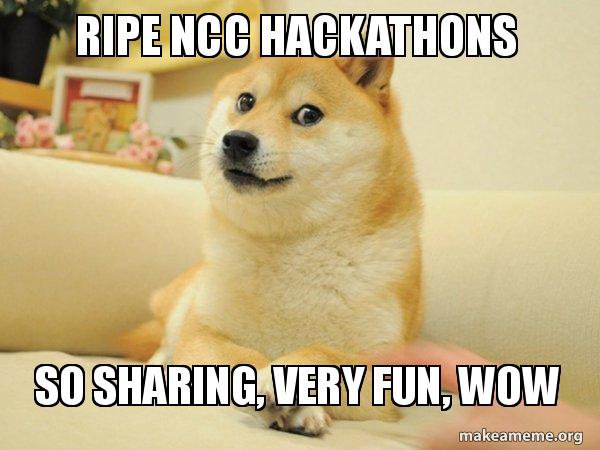
- 20-45 participants
- Production and publication (on GitHub) of lots of FLOSS: code, software tools, software libraries, data analysis
- Presentations at RIPE, IETF and other meetings, research papers and articles published on RIPE Labs
- Between one and three sponsors for each hackathon
| Date | Location | Co-located with | Topic |
|---|---|---|---|
| March 2015 | Amsterdam | stand-alone | RIPE Atlas DataViz |
| October 2015 | Bucharest | RIPE 71 | RIPE Atlas Tools |
| May 2016 | Copenhagen | RIPE 72 | RIPE Atlas Interface |
| October 2016 | Madrid | RIPE 73 | IXP Tools |
| April 2017 | Amsterdam | stand-alone | DNS Measurements |
| November 2017 | Copenhagen | IPv6 Week | IPv6 |
Inspiration for…
We are proud to have inspired many similar events in the communities in which our participants are active. Since we started out, there have been several events directly connected with or inspired by RIPE NCC hackathons:
- February 2016: CAIDA BGP hackathon
- July 2017: Internal RIPE NCC Collabrathon
- September 2017: "What The Hack", hackathon on topic of DDoS, organised by NL-IX
- September 2017: 1st LACNIC hackathon
- February 2018: 1st APNIC’s Hackathon
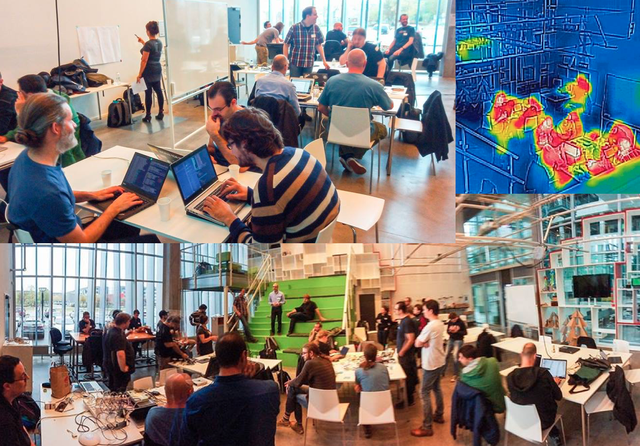
Impressions from the IPv6 hackathon in Copenhagen
Long-term Benefits
Results of the hackathons have been both immediate and long-term: during the event, we all benefit from creating new connections with people, learning from each other, and contributing to each-other's projects; after the event, other people get to use the tools that are created, either stand-alones, or as "patches" to the existing FLOSS tools.
Sometimes we see good follow-up work so that projects that started as quick hacks continue to be developed and deployed. These results vary in format: either they are software projects or research papers or a feature that gets included in existing tools. Sometimes it's an intern position that creates lasting collaboration or a follow-up event. See some examples below.
Success Story: from DISCO to Health
Since the first hackathon, we've seen several projects dealing with the "disconnection of RIPE Atlas probes" and how that illustrates the general (lack of) reachability of services, companies, regions and countries.
In April 2015, one of the projects was called DISCO - "Real time atlas probe disconnect monitor". It combined RIPE Atlas data with the Twitter feed and weather info, then visualised it on a fancy dashboard - and that was the winning project!
In May 2016, another group continued the work with a project they called Tartiflette (Near Real-Time Anomaly Detection from RIPE Atlas Stream). They later published a paper called DISCO and implemented the project on a stand-alone website called Internet Health Report.
"The Internet Health Report helps network operators to monitor network conditions. Network performance data is collected with RIPE Atlas and analyzed with a set of tools pinpointing delay changes, forwarding anomalies and network disconnections."
Success Story: Alice (through the) Looking Glass
This was presented at the DENOG 9 meeting in November 2017:
Alice-LG was born during RIPE NCC’s RIPE 73 hackathon in Madrid where our developer Matthias Hannig joined forces with INEX’s Barry O’Donovan’s team to build a front-end for Barry’s new BIRD API, Birdseye. We decided to further develop this new looking glass into Alice-LG. A huge thanks to Eileen Gallagher from INEX for coming up with that name.
A pretty sweet feature which Alice-LG throws at us is her REST API, some examples:
- lg.ecix.net/api/routeservers
- lg.ecix.net/api/routeservers/0/neighbours
Alice-LG is developed in-house at ECIX, but it is entirely open source and available to all at github.com/ecix/alice-lg
Known Alices:
Development on Alice-LG is ever ongoing. If you find a bug, miss a feature, or miss documentation don’t hesitate to open up an issue on GitHub.
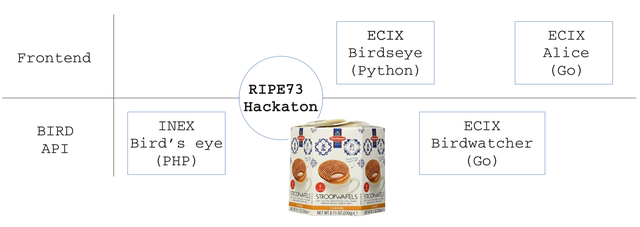
From idea to hackathon project to open source product
Success Story: PCAP
During the sixth hackathon, in November 2017, a small team single-handedly improved the security in IPv6 networking for the years to come: they patched the libpcap library (used by WireShark and tcpdump) to add support for symbolic filtering for ICMPv6 packets type field values.
The patch and the documentation were accepted during the hackathon weekend!
So, since then, all the users that directly download libpcap from GitHub had the benefit of being able to make use of these new features. And the users of all the Operating Systems that include this library will be able to use improved IPv6 troubleshooting, once their systems have been upgraded.
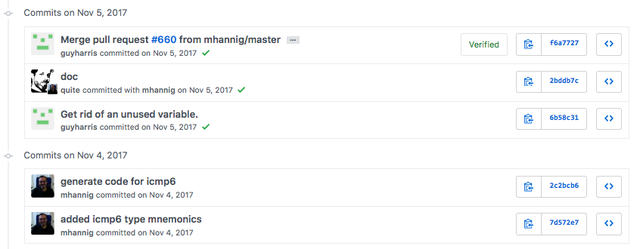
Presentations at NOGs
There is a big overlap between our hackathon participants and the people going to local NOG meetings. This is how the good news spread - through presentations about various projects, and about hackathons themselves.
- Alice-LG was presented at NLNOG in September 2017 and at DENOG 9 in November 2017
- December 2017: Presentation of IPv6 Hackahton results at GRNOG
- 6 November 2017: Danish IPv6 Day
- Various RIPE Meetings
Let us know if you would want us to add a link to your presentation!
There were also lots of follow-up articles in the previous three years:
- November 2016: Remote Peering Jedi
- October 2017: Update on Reverse DNS statistics by RIR team
- November 2017: ISOC Blog post about IPv6 Hackathon

Will Code For T-Shirts!
Future Plans
In 2018, we plan to organise two hackathons in cooperation with other organisations:
In addition to that we will be talking part in other hackathons:
- APNIC in February in Kathmandu,
- February, with the University in Lebanon
- IETF in March in London
- And others - invite us!
For future hackathons we heard the following topics could be interesting to our community: IoT, sustainable Internet, security, data visualisations, measuring Internet disruptions, and any combination of the above.
Invite us to be your partner in organising hackathons: we have experience, we have open data and tools, and we have a great community to bring along!
You can read all about past and future RIPE NCC hackathons on RIPE Labs. Don't hesitate to contact labs@ripe.net for details.




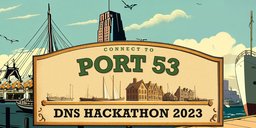

Comments 1
Comments are disabled on articles published more than a year ago. If you'd like to inform us of any issues, please reach out to us via the contact form here.
Alexander Isavnin •
Dear Vesna! Let me gently remind, that RIPE Hackathons were inspiration for three Russian Internet Measurements Hackathons in Aug 2016, Feb 2017, May 2017 - two were great success and one - deferred success. Some fotos could be found at events pages: https://www.facebook.com/events/1587723524856470/?active_tab=discussion https://www.facebook.com/events/1426934460659344/?active_tab=discussion https://www.facebook.com/photo.php?fbid=459687057714176&set=gm.1360532347365212&type=3